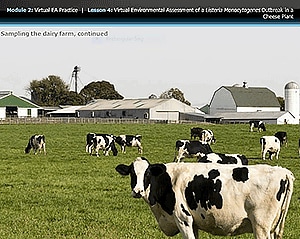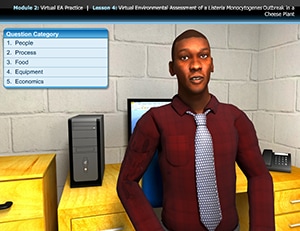Environmental Assessment Training Series (EATS)
The skills needed to investigate outbreaks of foodborne illness in restaurants are different from those needed to inspect restaurants. It is critical to have environmental health staff on outbreak investigation teams. EATS provides training on the role of environmental assessments in the broader context of outbreak investigations and the food safety system.
First time here? Register for EATS by creating a new account.
Already registered? Log on.
What are the benefits of this training?
It’s free and available anytime: Take the courses at your own pace in this online learning program.
It’s practical:
- Learn how to identify an outbreak’s environmental causes.
- Learn how to recommend appropriate control measures.
- Practice conducting virtual environmental assessments, including identifying the factors that lead to outbreaks.
You can earn continuing education units (CEUs) from CDC after completing the courses and final evaluation (optional). See specific courses for details.
What topics are addressed?
EATS 101: Foundation Skills – available now
Learn concepts, key skills, and steps for environmental assessments of restaurants implicated in an outbreak.
Complete simulated exercises to practice interviewing food workers, collecting environmental samples, and determining how and why germs got into the environment and spread.
First time here? Register for EATS by creating a new account.
Already registered? Log on.

EATS 102: Skill Building – not available (under maintenance)
- Practice applying environmental assessment skills in multiple outbreak scenarios:
- A private school
- A local catering establishment
- A grower and distributor of organic herbs and
- A cheese manufacturer.
How to earn CEUs for EATS 102. (EATS 102 is under maintenance; CEUs are not currently available).
Note: The EATS platform also includes Food Defense, a course by the Food and Drug Administration.

How long does it take?
EATS 101 took pilot testers an average of 9 hours to complete, and EATS 102 took an average of 6 hours to complete. Users can save their place and return later.
Who is the training for?
Environmental health professionals and food safety program officials in government agencies are the primary audience for this training. Food safety professionals from scientific, industry, and consumer groups may also benefit from it.
CDC encourages environmental health staff to apply their knowledge of environmental assessments by
- Conducting environmental assessments during outbreak investigations and
- Reporting data from these assessments to CDC’s National Environmental Assessment Reporting System (NEARS).
Data collected in NEARS will help CDC and other public health professionals understand why and how outbreaks happen.
What are people saying?
We tested this course with environmental health, and food safety staff. Users said:
- “Loved the addition of the perspective of both the farm and the processing plant: helps me as an inspector in retail have a grasp on the further ramification of any investigation I conduct.” (Learner taking the course for CEUs)
- “Probably the best online training I’ve ever done! There were lots of interactive portions…I’ve already used some of the questioning tactics…I think it would help any inspector for outbreaks…Two thumbs up!” (Environmental Health Specialist, Minnesota Department of Health)
- “It is by far the best online training I have taken.” (Jennifer Pierquet, MPH, Iowa Food Safety and Consumer Bureau)
- “This was a good training class. If I think about our EH staff this would be a great tool for them since they are not routinely conducting environmental assessments in relation to outbreak investigations – so this allows them to actually complete one. This should help them be more prepared and have the knowledge of who to include when this situation arises in their inspection area.” (Learner taking the course for CEUs)
- “I will be a more effective foodborne illness investigator.” (Learner taking the course for CEUs)
9 in 10 users who took the training for CEUs agreed that the training
- Addressed a need or a gap in their knowledge or skills and
- Effectively met their educational needs.
EATS students show a 40% increase in knowledge of environmental assessments.
Want more information?
- EHS e-Learning
- EHS Food Safety Resources
- National Environmental Assessment Reporting System (NEARS)
- What Are Environmental Assessments?
Contact us for EATS questions and technical assistance.
* Note: EATS 101 was formerly e-Learning on Environmental Assessment of Foodborne Illness Outbreaks.
EATS has links to external websites. Linking to a non-federal website does not constitute an endorsement by CDC or any of its employees of the sponsors or the information and products presented on the website. You will be subject to the destination website’s privacy policy when you follow the link. CDC is not responsible for Section 508 compliance (accessibility) on other federal or private websites. For more information on CDC’s web notification policies, see Website Disclaimers.